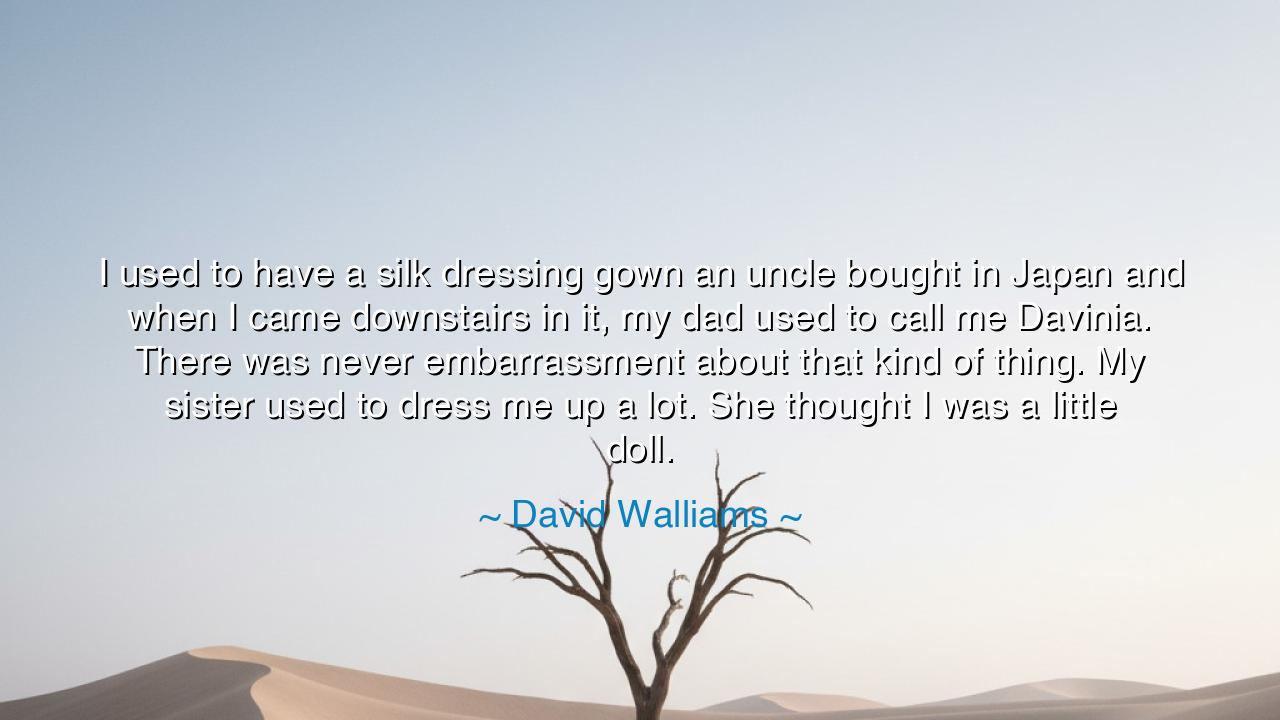
I used to have a silk dressing gown an uncle bought in Japan and
I used to have a silk dressing gown an uncle bought in Japan and when I came downstairs in it, my dad used to call me Davinia. There was never embarrassment about that kind of thing. My sister used to dress me up a lot. She thought I was a little doll.






“I used to have a silk dressing gown an uncle bought in Japan, and when I came downstairs in it, my dad used to call me Davinia. There was never embarrassment about that kind of thing. My sister used to dress me up a lot. She thought I was a little doll.” These words, spoken by David Walliams, shimmer with warmth and memory, yet carry a deeper reflection on identity, acceptance, and the freedom of self-expression. In his recollection, one hears not merely a story of childhood play, but an echo of the ancient truth that to be oneself — unashamed, unhidden — is one of life’s purest forms of courage.
In the days of youth, before society’s judgments press upon the heart, the soul moves freely between worlds — masculine and feminine, strong and gentle, playful and profound. Walliams recalls a time of innocence, when wearing a silk dressing gown did not challenge identity, but celebrated imagination. His father’s affectionate teasing and his sister’s delight reveal a home where love outweighed conformity, where laughter and curiosity were allowed to shape a child’s being. This kind of freedom, though small in appearance, is the soil in which empathy, creativity, and self-knowledge grow.
The ancients would have called this harmony between self and soul the balance of opposites, a union of qualities that makes a person whole. For just as the earth requires both sun and rain, so does the human spirit require both gentleness and strength. The great philosopher Plato spoke of the soul’s three parts — reason, courage, and desire — each necessary for balance. Likewise, in Walliams’s story, the silk gown and the teasing smile become symbols of this unity: the child who can laugh at himself, who can play without fear, is the one who will later create without limits.
Indeed, it is no coincidence that Walliams would grow to become an actor, writer, and performer — a man whose art often blurs boundaries between the absurd and the tender, the masculine and the feminine. His childhood experience was not trivial; it was foundational. In those early games of transformation — of dressing up, pretending, inhabiting different selves — he was learning the sacred craft of the artist: the ability to see the world from many angles, to step into another’s skin without shame. What society calls “play,” the wise recognize as practice for empathy.
Such acceptance in childhood is rare, yet powerful. Contrast it with the lives of those whose early expressions of difference were met with ridicule or suppression. The poet Oscar Wilde, brilliant and radiant, was mocked and punished for daring to live beyond the rigid expectations of his age. His genius could not be extinguished, but his suffering revealed the cruelty of a world that fears what it cannot define. Walliams’s story, by contrast, shows what beauty flourishes when a child is allowed to explore without fear — when the home becomes a sanctuary, not a stage of judgment.
There is also humility in his tone — a kind of wistful gratitude. “There was never embarrassment about that kind of thing,” he says, as though marveling at how rare that kindness was. In these words, the listener feels a reverence for family love — not a perfect love, but one rooted in acceptance and playfulness. It is a reminder that every parent, every sibling, holds within them the power to either nurture or wither the young spirit. When laughter replaces shame, when affection welcomes curiosity, the child grows fearless in being themselves — and from that fearlessness, greatness is born.
Let this memory of a silk gown and a playful name be your lesson: embrace what makes you different, and allow others the same grace. Do not crush the imagination of the young with the weight of your expectations. Celebrate their explorations, however strange, for in them lies the seed of their becoming. As Walliams’s story shows, the path to authenticity begins in moments of innocence — in laughter shared, in freedom granted, in love given without condition.
For in the end, the silk gown is not a garment but a symbol — a reminder that beauty, creativity, and identity are woven from the same fabric: the courage to be oneself. And when that courage is nurtured, as it was for David Walliams, it creates not only an artist, but a soul unafraid to shine.






AAdministratorAdministrator
Welcome, honored guests. Please leave a comment, we will respond soon